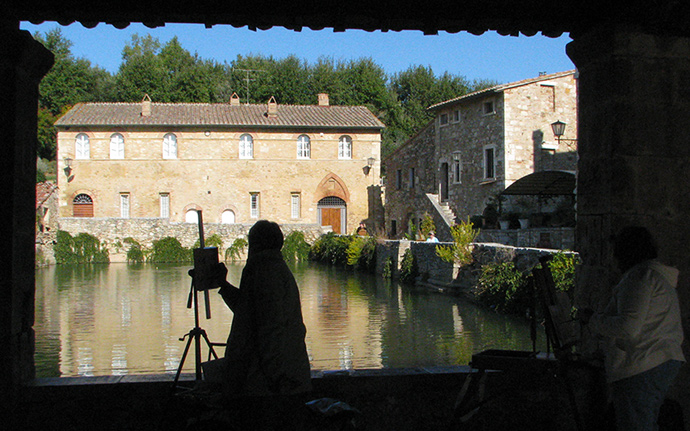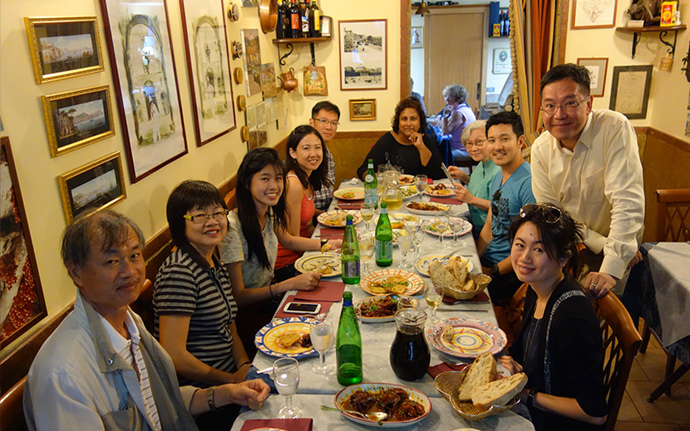Some questions people have asked us over the years:
Rome, Florence and Venice make up the three most popular cities to visit for first time travellers to Italy. Each of these cities has a very distinct identity, and each really deserve at least 3 nights for a proper introduction, so plan on spending a minimum of 9 days there. You could also combine these with a couple of nights in the other principal port of entry, Milan, also unique and very different from the other three, giving you a peek into the enormous diversity that Italy offers. With these 4 cities, you could consider doing an itinerary which starts say in Rome and finishes in Milan, or the other way around, so that you won’t need to do any backtracking, like our basic but highly customisable Classic Italy.
For anyone visiting any place further than a 3-hour flight away, we would recommend at least a week, if not more. Even more if you are flying in from another continent. After all, you are already spending practically a day's worth of time and a lot of money simply to get to where you want to go and returning home at the end, so you might as well make the most of this. Italy has more than enough to offer for two weeks, a month, a year, indeed a lifetime, even for the Italians themselves, and even a single city like Rome by itself can keep you busy for weeks on end.
Spring and Autumn are undoubtedly the most comfortable time of the year to visit Italy, but each season has its particular attractions.
Italy is at its greenest and most flamboyant with wild flowers from late March all the way to June, with a continuous change of colours in the countryside from the delicate to the most vibrant as summer approaches. Autumn, along with the spectacular fall colours, is the time of harvests, with an abundance of freshly harvested produce ranging from pumpkins and apples to mushrooms and truffles. October is also the time of the grape harvest, and soon after this the pressing of olives for the freshest extra-virgin oil.
Summer tends to be uncomfortably hot as well as overly crowded with tourists, but this is also the time of music festivals and other major cultural events, as well as the best time to visit the mountains at their greenest.
Winter finds Italy with the fewest tourists, and therefore also at its most authentic, with the major cities regaining their original ambience. Winter temperatures tend to be mild in the south, while up north it might hover around 5°C in the daytime in the Po valley.
There are plenty of places to explore and things to do in between the classic destinations. That is our specialty in fact — places off the beaten track that no one else would even know about! We even have an entire section of our site dedicated to this.
This is where we come in! From farm stays to thermal spring resorts, from hidden archaeological sites to learning to sing Gregorian chant, from watching erupting live volcanoes to exploring WWI battle sites climbing the Via Ferrata in the Dolomites, Italy is overflowing with ideas and activities which you might never even have imagined! Our Inspiration pages show but a small selection of how much Italy has to offer.

As a country of friendly people, Italy is one of the safest places in Europe as far as crime and physical violence are concerned. Nevertheless, do bear in mind that as a major tourist magnet Italy will also have its share of petty crime, particularly in the major centres of tourism such as Naples, Rome, Milan, etc, which attract plenty of pick-pockets from all over the world. Always be vigilant and ensure that no stranger comes too close to you, especially when riding the crowded metro trains or buses. Also note that many petty criminals are now so well-dressed you would not be able to tell them from the average office worker.
The principal ports of arrival and departure for major international flights are Rome and Milan, but there also major international airports in Venice, Naples, and Catania, with smaller ones serving a limited number of international connections all over the country. With the rising popularity of budget carriers, many previously minor airports such as Bergamo, Bologna, and Palermo have seen their passenger numbers growing considerably in the recent years, though these usually cater to connections within the European Union.
Flight bookings are not included, but we do provide you with all the services you desire from the moment you arrive to the moment you leave. This allows clients to select the most economical option available to them, and is much more flexible for those who are obliged to make more complex flight arrangements such as various parties arriving from different locations to meet up in Italy. Frequent flyers are also free to arrange their flights with their preferred airlines. In any case, the most economical air fares are usually found online directly with the airlines themselves, so we would encourage you to book with them.
There really isn’t any real limitation on the number of persons we cater to. We have even organized trips for single persons, as we have also done for 18. Rather, it is more a question of finding a proper equilibrium between your expenses and the quality of the experience. Clearly, economy of scale will kick in for larger groups while travelling alone will be much more expensive. You would still need to pay for group services such as transfers and guides regardless of the number of persons. For a good balance between cost and quality we suggest a small group of 4-6 persons, going up to a maximum of 16-18 persons. Any more than than will mean losing the sense of intimacy that a small group provides.
A private guide will cost roughly what you would pay for 3-4 persons’ participation in an organized group tour provided by a local operator, but as far as quality of experience is concerned, hiring a good private guide (emphasis on GOOD) will always be the option to go for compared to signing up for a local day tour. The guide will be focused on your needs after all, and so not only will you get to ask all the questions that comes to mind at any time, you can also pace your time with the guide to be as leisurely (or not) as you prefer, stopping anytime you wish to linger on a particular detail, take a short rest or even buy a gelato on the way.
Following an organized tour group on site will not allow such flexibility, and you will be limited to the schedule set by the tour operator, but the one advantage is that you will encounter people from other places who might ask some questions you wouldn’t even have thought of.
Practically everyone working within the tourism sector will be reasonably fluent in English, but don’t expect the average person on the street to speak anything but a smattering of the language. However, Italians are famous for being friendly and helpful even when language fails them, so just take this as part of the fun!
Still, if you are living in Singapore and wish to pick up some basic Italian before you go there, you might like to consider taking up this Crash Course offered by APICS Italian Cultural Centre.

Unless you are going for the big international hotel chains, most hotels in the major city centres are housed in historical buildings, which mean that rooms likely to be oftentimes somewhat smaller than what you are used to elsewhere and sometimes quite unusually shaped as well. Higher quality hotels, which we collaborate with, will always have bathrooms attached, though because of the aforementioned historical setting, may be fitted with either a bathtub or a just shower depending on its shape and size. If you have a preference for one or the other, you would need to let us know beforehand for us to inform the hotels so that they can reserve the appropriate accommodation for you.
Other than breakfast, which is always provided, we usually include about 50% of the meals during an organized tour, which lets participants enjoy the local cuisine which we promote as a policy, while still allowing the opportunity to dine privately on their own (or not even dine at all after eating so much during the meals together!). In line with our adherence with the principles of responsible and sustainable tourism, we avoid overordering to minimise wastage, but at the same time will be happy to provide you with more if you wish to continue eating.
On the other hand, for custom-arranged trips the number of meals will be entirely left to the clients’ preference, anywhere from every meal (we do not encourage this) to none at all. More likely than not, organized meals will be proposed when a guide is present who can help to explain the various local dishes served.
Decent 4-star hotels will provide a buffet spread that will include breads, cereals, cold cuts, fruit and fruit juices, yoghurt and milk on top of your usual coffee and tea, and most may even have hot items like sausages and scrambled eggs. There will some specialty accommodations such as farmhouses and alberghi diffusi (these are rooms spread out over a neighbourhood rather than within a single building, like having your own private apartment in the village) which will stick with the more traditional breads and croissant with the usual beverages, along with perhaps some cereals, which will also be typical of 3-star hotels, even if there are many exceptions to this. The classic modern Italian breakfast is a minimal affair after all: usually just a caffelatte (an espresso poured into a large cup of hot milk) and some biscuits to dip in.
We take note of your dietary restrictions such as allergies and intolerances for all the organized meals we arrange for you, and will also provide you with a small note as well which you can keep in your pocket to let restaurants know of this when you are dining on your own. Vegetarians are lucky in Italy. Practically all traditional restaurants will offer meatless dishes as part of their standard menu anyway, while vegans can now enjoy a growing number of restaurants catering to this in the larger cities. There is also a small but growing number of restaurants offering a choice of dishes for those with celiac disease.
Muslims should note that while there aren’t any halal restaurants serving Italian dishes, they will still have the opportunity to enjoy local fare by visiting kosher restaurants in the Jewish quarters of the major cities.
Indeed. It’s the best thing since sliced bread. Few other countries offer this wonderful contraption to help with personal hygiene. Enjoy it while you are there!
Other than the usual bath towel, better hotels usually offer a medium-size towel for the face and hands at the washbasin, and a smaller one for use at the bidet. Don't mix them up! On the rare occasion that one or more is missing, perhaps due to an oversight on the part of the maids during the daily cleaning, you can always call reception any time to have them brought over to your room.
You can pay using cheques, bank transfers, PayNow (if you have an account with one of the approved Singapore banks), as well as online using VISA and MasterCard.
More questions? Get in touch!
This site is protected by reCAPTCHA and the Google Privacy Policy and Terms of Service apply.
